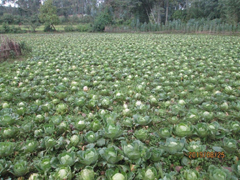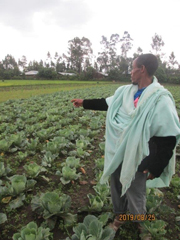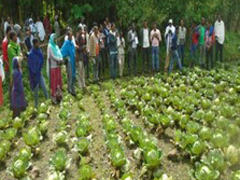- Home
- Technical Cooperation Projects
- Index of Countries
- Africa
- Ethiopia
- Project for Smallholder Horticulture Farmer Empowerment through Promotion of Market-Oriented Agriculture (Ethio-SHEP)
- Project News
- Mr Fekadu's changes since joining Ethio-SHEP project
Project News
2019-12-05
Mr Fekadu's changes since joining Ethio-SHEP project
Mr. Fekadu is a typical small holder farmer in Amhara region with 0.25 ha of land used for both rain-fed and irrigation production, however, he made big changes in his horticulture production after he joined Ethio-SHEP project in 2017. Before the project, he used to produce mainly potato for home consumption in irrigation season. Getting awareness of the good opportunities of Horticulture production, he gradually started investment on vegetable production as source of income increment.
He allocated more land for vegetable and increased his production. In 2019, he rented additional 0.75 ha land for head cabbage production paying 17,000 ETB (=586US$) for one season. Also he has increased the land allocated for potato production (doubles the land for potato). Now he is planning to rent 4 ha of land for next irrigation seasons. In 2017, he produced 300kg of potato just for home consumption. In 2018 he produced 900kg of potato for market. In 2019, he produced 18,000kg of head cabbage. Productivity of head cabbage is also very good (14,400kg/ha). Quality of head cabbage was also improved. For instance, the size and weight of each head cabbage was very good which attracted traders; one head cabbage weighs about 1.5 kg, previously it was only 0.5 kg.
Mr. Fekadu also mentioned that reason behind of the increased production amount was he has started to apply the following production techniques after the project intervention: proper nursery management(sowing in row at nursery)& transplanting, proper fertilizer application rate and amount, , water management (used to apply flood irrigation before, but now using furrow irrigation), crop rotation of land by using malt barley and wheat. Another reason what Mr. Fekadu mentioned is changing the planting time to adjust to the high price time before he tried to produce head cabbage only in dry season, but he started to produce it from 2nd irrigation season to rainy season in 2019.
Previously, Mr. Fekadu produced small amount and supplied to local market for retailers. But he met several market stakeholders in Market Linkage Forum organized by the project and recognized a farmers cooperative union had contract agreement with University to supply vegetable. He started to communicate with them for business linkage and increased the production amount. In 2019, Mr. Fekadu finally supplied his head cabbage to the University through that cooperative union. District agriculture expert mentioned that market linkage through union has been one of the important experiences not only for Mr. Fekadu but for the whole districts. After observing this linkage, majority of farmers in his village are motivated to produce horticulture crops and some of them already started head cabbage production.
This year, Mr. Fekadu invested more money for horticulture production and expected to earn more income. He discussed with the community and mobilized to rehabilitate the feeder road to improve the access to the market. He also constructed warehouse for potato storage both for their own consumption as well as seed potato storage. Moreover, Mr. Fekadu has created seasonal employment opportunity for unemployed residents in his village. Now, Mr. Fekadu has confidence to improve his livelihood through investing in horticulture.
 Cabbage field og Mr.Fekadu.
Cabbage field og Mr.Fekadu.
 Mr. Fekadu and his cabbage field.
Mr. Fekadu and his cabbage field.
 The field day organized by the district at Mr. Fekadu's field.
The field day organized by the district at Mr. Fekadu's field.
- About JICA
- News & Features
- Countries & Regions
- Our Work
- Thematic Issues
- Types of Assistance
- Partnerships with Other Development Partners
- Climate Change / Environmental and Social Considerations
- Evaluations
- Compliance and Anti-corruption
- Science and Technology Cooperation on Global Issues
- Research
- JICA Development Studies Program / JICA Chair
- Support for the Acceptance of Foreign HRs / Multicultural and Inclusive Community
- Publications
- Investor Relations
